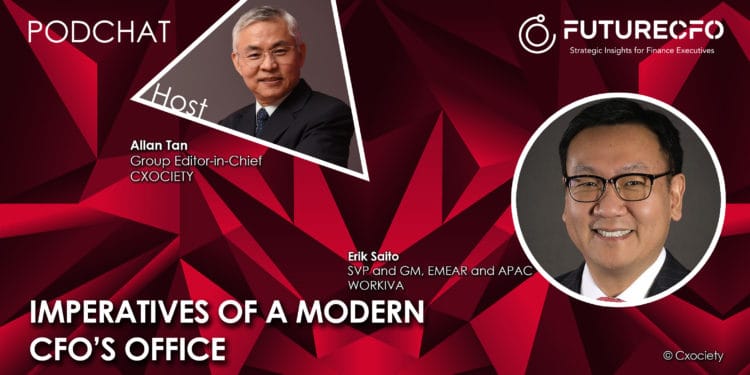Challenging may be the appropriate word to document the environment that will greet businesses in 2023. We are faced with continuing supply chain shortages, a war in the West that promises to keep energy costs for the immediate future, and rising inflation – not to mention the shadow of a pandemic that mutates too frequently to offer respite for governments, citizens and businesses.
In the book, "Leaders. The Strategies For Taking Charge," economists and authors Warren Bennis and Burt Nanus described the challenges posed to management and leadership by various external factors and what the consequences are for corporate leadership.
VUCA or Volatility, Uncertainty, Complex and Ambiguous was the US Army War College’s response to the collapse of the USSR. Today VUCA is being applied to many of the conditions we are facing today.
Erik Saito, SVP and GM for EMEA and APAC for Workiva, describes today’s business climate as ambiguous and unpredictable.
“With the world still recovering from the pandemic and the war in Ukraine going on, as you’ve mentioned, has led to a disruptive, unpredictable and uncertain business climate,” he elaborated.
What does VUCA mean for the CFO as a leader and strategist?
Erik Saito: The way I look at a CFO is two-prong: one is a strategist and advisor to the company and a steward of value for the company.
When you have an environment described by VUCA, one of the things that a CFO thinks about immediately is how to manage the uncertainty and risk that comes from a VUCA environment.
What it means specifically to a CFO or office of a CFO is, what are we going to do about the VUCA environment to manage the risk to our business so we can ensure that we can protect the business to survive through this environment?
How would you compare the focus of the CFO pre- and post/during VUCA?
Erik Saito: I think pre-VUCA, CFOs focused more of their time on the ‘classical’ idea of managing risk. i.e., how do you ensure that there are good controls, governance, and good processes for compliance, whether it’s reporting numbers or compliance with regulations?
Post-VUCA, because of the uncertainty around the environment businesses are operating in, increasingly the decision-making process on what a business must do to get through that VUCA environment is more complex.
It involves multiple functions within a business. And because of that, in a post-VUCA world, the CFO is being asked and is expected to play a bigger role because of their ability to see across functions, across the entire business, unlike any other c-level role.
Post-VUCA, the CFO’s role is elevated and expected to play a much more critical role in helping a business navigate that complex environment.
For the finance team, how is VUCA impacting the team in the performance/fulfilment of their functions?
Erik Saito: In this type of environment, it’s very often the case that businesses going through a challenging period will have to make very difficult decisions, doing more with fewer resources, diverting resources from one place to another, and so on.
Most finance functions in periods like this are likely spending a lot of their time reacting to sudden changes in the business, stakeholders asking for quantifiable results of businesses in real-time so they can make hopefully quicker, more informed decisions to try to get the business through that challenging period.
How should the CFO (and finance team) adjust how they perform their duties to reflect VUCA conditions?
Erik Saito: I believe that the CFO and the office of the CFO, the finance team, need to step up and realise the strategically important role that they play in getting the businesses through this challenging period.

"Given the connectedness of the entire process from supply chain impact to cost pressures, to revenue pressures, to retention pressures with the employee base, and all kinds of areas, the office of the CFO is the only C-level team that has visibility across the entire business, regardless of their business model."
Erik Saito
Number two, the requirement for any type of decision and analysis requiring data, across all functions, is so necessary for a VUCA environment and the CFO is the only function that has access to all data, within the company, besides the CEO.
And finally, stakeholders in periods like this, then ask questions, like, what does this mean to our business? How does this impact our business and what do we do about it, stakeholders are asking the question in quantified terms, which means that the question has to be answered by people who are trained in quantitative methods, i.e., the CFO’s office and the CFO.
To what extent do you see technology as enabling the CFO and finance team to continue being effective in times of VUCA?
Erik Saito: I think technology is a tool that enables the CFO and finance team to realise that reality. The office of the CFO has always been classically viewed as a back-office function. This means they spend most of their time compiling information, reporting numbers and so on. It’s more of a reactive role than a proactive role.
But what technology does is, it enables the CFO to save time, and enhance productivity in their classical role. The CFO will always be viewed as having a very critical role in ensuring good governance, compliance, and all that.
What technology can do is help the CFO to spend less time for the same resources on those stewardship activities and reallocate the resources and time to the more strategic, advisory activities that I mentioned earlier.
Any recommendations for the CFO and finance leadership to be more effective in times of VUCA?
Erik Saito: I would recommend that the CFO and the office of the CFO look at the technology that enables them to change the way they work. By this, I mean to enhance productivity in times of crisis like this.
Because their time is so much more valuable than they realise, as compared to the past. The organisations that they are a part of, now need them more than ever, to step up and be advisors.
The more that they can review and deploy technology that enables them to spend less time on manual things they used to do. So that they can reallocate their time and resources to something much more valuable, which is for them to be advisors i.e., spending time to analyse the data, rather than compiling data, then using that analysis to then say: what does this mean to our business, and what can we do about it?
“I would advise CFOs to look for technology that can save them time. Stop manual processes. Stop things that slow down your team from being strategic advisors to the business because they need you,” he concluded.
Click on the PodChat player and hear Saito describe the challenges and opportunities that the office of the CFO has as it tackles VUCA in the modern, post-pandemic digital era.
- How would you characterise the business climate today?
- What does VUCA mean for the CFO as a leader and strategist?
- How would you compare the focus of the CFO pre and during VUCA?
- For the finance team, how is VUCA impacting the team in the performance/fulfilment of their functions?
- How should the CFO (and finance team) adjust how they perform their duties to reflect VUCA conditions?
- To what extent do you see technology as enabling the CFO and finance team to continue being effective in times of VUCA?
- Any recommendations for the CFO and finance leadership to be more effective in times of VUCA?




